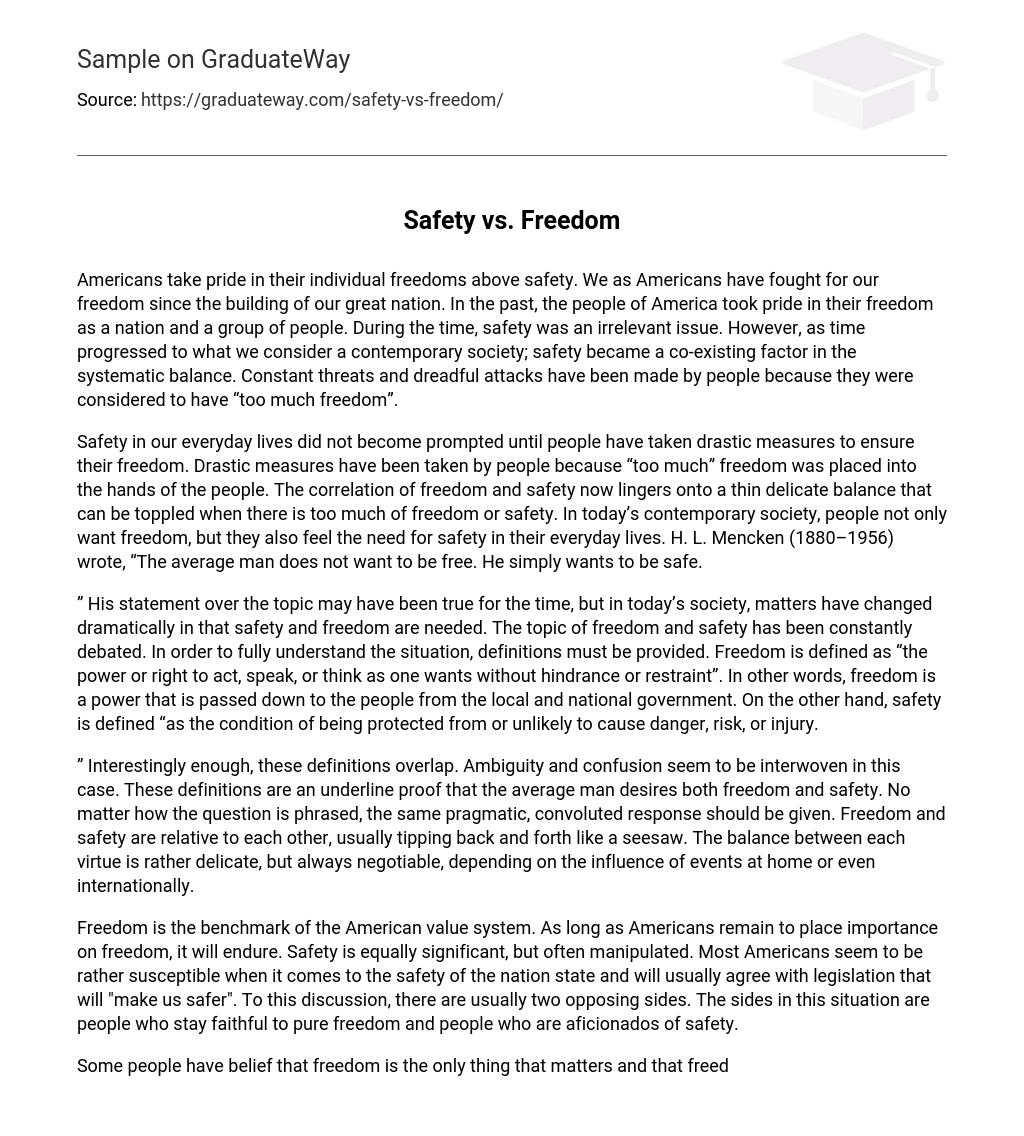Americans have historically cherished their individual freedoms, a cause they have actively defended since the founding of their nation. In the past, Americans also took pride in their shared freedom as a unified country and citizens. However, contemporary society has witnessed the emergence of safety as an indispensable concern alongside freedom. This shift is a response to ongoing threats and devastating attacks carried out by individuals who perceive Americans to possess “excessive freedom”.
Due to the excessive freedom granted to individuals, safety has become a concern in our daily lives. People are taking extreme measures to ensure their freedom, which can disturb the delicate balance between freedom and safety. In today’s society, people not only desire freedom but also recognize the significance of safety in their everyday lives. H. L. Mencken (1880–1956) captured this sentiment when he stated, “The average man does not crave freedom; he simply yearns for security.”
Although his statement about the topic may have been accurate in the past, there have been significant changes in today’s society regarding both safety and freedom. The ongoing debate revolves around balancing freedom and safety, necessitating clear definitions. Freedom can be defined as the power or right to act, speak, or think without hindrance or restraint—a power granted by local and national governments. On the other hand, safety is characterized as being protected from danger, risk, or injury.
Curiously, these definitions have a common ground as ambiguity and confusion intertwine. These definitions highlight the evidence that the typical individual craves both freedom and safety. Regardless of how the query is formulated, an identical practical and intricate answer should be provided. Freedom and safety are interconnected, often oscillating like a seesaw. The equilibrium between each quality is quite fragile but constantly open to discussion, contingent on domestic or even global circumstances.
Freedom is a fundamental aspect of the American value system and will persist as long as it is valued by Americans. However, safety is also highly valued, although it can be easily manipulated. Many Americans are susceptible to prioritizing the safety of the nation and tend to support legislation aimed at enhancing it. This debate typically involves two opposing sides: those who prioritize pure freedom and those who are advocates for safety.
Some individuals prioritize freedom above all else and advocate for its paramount importance in the nation. Conversely, others place a greater emphasis on safety. Regardless of stance, the topic of gun control always sparks debate. In recent times, an unprecedented wave of mass shootings using firearms has plagued America. The traumatic incident at Sandy Hook has deeply affected the populace. Consequently, those concerned with safety vehemently argue for nothing less than a complete prohibition on gun possession. “…
The quotation from Sandy Hook emphasizes the correlation between stronger gun control laws and reduced acts of violence. Despite tragic incidents, some individuals still advocate for the right to bear arms. The debate surrounding freedom versus safety necessitates a clear distinction between the two. Recent events, particularly the shooting incident in Colorado, have intensified discussions on gun control. Those in favor of guns often invoke notions of freedom, liberty, and the second amendment to support their stance.
And people who are “anti-gun” might argue the importance of the safety and well-being of the general public, as they believe that limiting access to guns can prevent criminals and individuals with mental disorders from obtaining lethal weapons. Those who claim that freedom and safety are unrelated or prioritize one over the other have not fully considered the practical implications. Today, society expects both freedom and safety. While many Americans advocate for personal freedom, they also desire a sense of protection and security.
Increasing children’s freedom necessitates ensuring their safety, as seen in our homes where parents impose more protection while granting later curfews as the children grow older. In essence, curfews function as reasonable guidelines that should be adhered to. It is crucial during adolescence to show respect towards your parents and comply with the rules they set. As stated in “Why Curfews Should Be Enforced,” although these regulations may initially appear unjust or irrational, you will eventually comprehend their advantages and value your parents’ commitment to your welfare.
The text highlights the correlation between freedom and safety, emphasizing that as freedom increases, the need for safety also increases. It suggests that the existence of freedom relies on the necessity of safety, and vice versa. Contrary to popular belief, freedom and safety cannot be disconnected. They are intertwined, like a balanced formula, within a well-defined system. In today’s society, freedom is crucial for people’s liberties, while safety is essential for their security. Thus, both freedom and safety hold significant importance in contemporary life.





